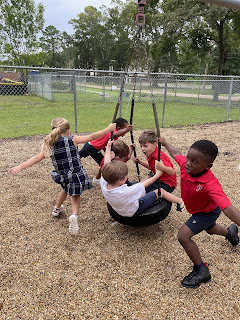"And I am sure of this, that he who began a good work in you will bring it to completion at the day of Jesus Christ." Philippians 1:6 ESV Each one of us is a work in progress. And five- and six-year-olds are growing and developing in many areas. An important aspect of Early Childhood Education is the development of social skills. In the school setting, young children are learning how to learn in groups. They're also learning how to interact with one another during playtime.
 |
| We're learning to help one another...find the page, read the word, understand the directions. |
 |
| We're learning to learn in a group setting...where we take turns talking, refrain from interrupting, and refrain from distracting our classmates. |
 |
| We're learning to play together, to share, to listen to our friends' ideas, to collaborate. |
 |
| We're learning to be considerate of our friends... |
 |
| ...and to take turns. |
 |
| We're learning to work together in pairs. |
 |
| We're learning to work together in groups. |
The EC teachers' professional reading this summer was a book entitled
The Importance of Being Little by early childhood expert Erika Christakis. In her chapter "Played Out," Christakis discusses how adults can help children navigate the inevitable conflicts that arise as children are learning to play together. She has much wisdom to offer on the subject, so I thought I'd share some of her advice.
"Sometimes we overidentify with our children, which makes us unreliable play coaches. I have been guilty of this many times, convinced my little darlings were being persecuted when in fact they were stirring up trouble...One of the unsung gifts of modern parenting is the enhanced intimacy we feel with our children, but it can be stifling to the cause of unencumbered play," she writes.
I can relate. As a young mother, I often tried to rush in and solve my children's social problems. But after 40 years of teaching young children, I've learned it's more important to teach children how to deal with conflicts that arise during play.
Here are Erika Christakis' recommendation to adults who want to help their children build resilience through play:
- Practice gentle deflection. When a child reports a negative incident on the playground, clarify that it's not dangerous or destructive, and then move on. ..say, "That sounds annoying, but let's see what' in your backpack."
- If a child reports being called mean words, empower her in a relaxed tone: "But we know you're not a baby! That sounds like silly talk to me."
- Redirect a child who makes sweeping generalities. ("He's always taking my toys away.")…Even little kids can have "frenemies" who grate on their nerves yet offer something worthwhile...rich, extended play serves the dual function of revealing these human challenges and teaching children how to cope with them.
- Remind our children that everyone has struggles to work on when they play. Some kids are shy. Some have trouble controlling their bodies. Some people are good at rules, but aren't very friendly....
- Avoid using the word "bully to describe one-off or even multiple episodes of unkindness from four-and five-year olds. "Bullying" is one of the most over-used words in the school lexicon...In any case, bullying requires a pattern of chronicity and intentionality that describes older children's behavior, not preschoolers' and kindergartners' play.
- Teach children to explicitly disengage when they are feeling put-upon. …If you don't want to be chased, stop running. If a child doesn't want to be the cage cleaner in the Animal Hospital game, she can insist on a new role... Or simply walk away. A new game is always waiting.
- And my most heartfelt suggestion" recognize our children's power. Young children are usually strong enough not to be knocked off their feet by an occasional bad play date and we don't need to stage-manage their play or try to process every infraction with them under the guise of learning, or try to arrange---pitifully and impossibly--for all experiences to be pleasant.
Christakis, Erika. The Importance of Being Little: What Young Children Really Need from Grownups. New York: Penguin Books. 2016







No comments:
Post a Comment